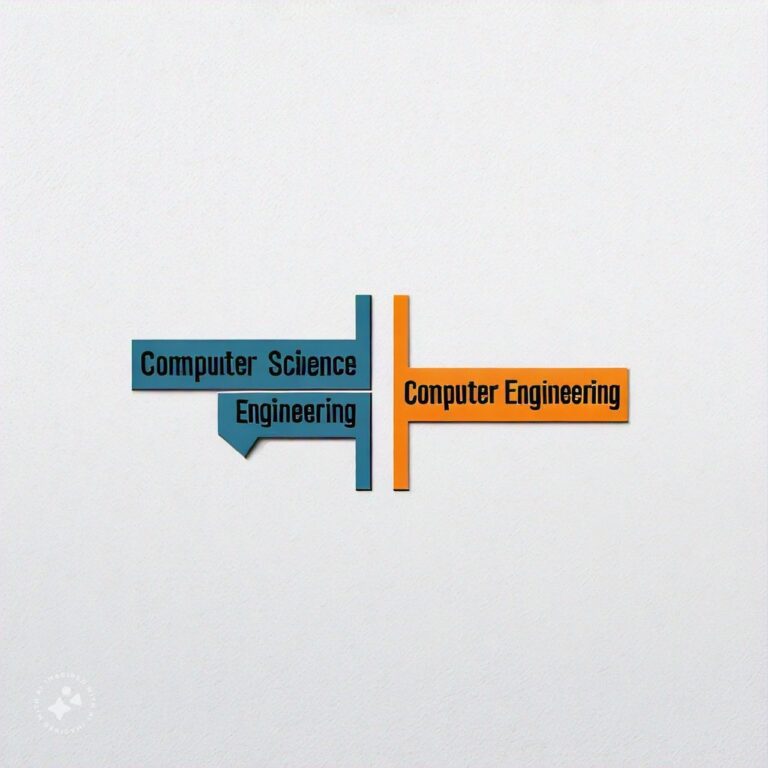
Differences Between About Job Opportunities for Computer Science and Computer Engineering
Job opportunities for computer science and computer engineering are abundant and continue to grow due to the increasing reliance on technology in every aspect of modern life. Both fields offer exciting career prospects, but they focus on different areas of technology. Computer science primarily deals with software, algorithms, data structures, and the theoretical foundations of computing. Graduates of computer science programs often find jobs in software development, data science, cybersecurity, and artificial intelligence, to name a few. Their work focuses on designing, developing, and maintaining software systems that power applications, websites, and computer networks.
On the other hand, computer engineering focuses on the hardware side of computing, integrating principles from electrical engineering with computer science. Computer engineers design, develop, and maintain the physical components of computer systems, such as processors, motherboards, and integrated circuits. They often work on embedded systems, robotics, and the development of new hardware technologies. While both disciplines share some overlap, especially in programming and systems architecture, their core areas of expertise differ, leading to distinct job opportunities. The demand for skilled professionals in both computer science and computer engineering is high, with opportunities spanning industries like tech, finance, healthcare, automotive, and telecommunications.
About Job Opportunities for Computer Science Overview
Computer science graduates are well-prepared for a wide range of roles in the technology sector due to their strong foundation in programming, algorithms, and software development. Below are five key job opportunities for individuals with a degree in computer science.
1. Software Developer
Software developers are responsible for designing, coding, testing, and maintaining software applications. This can range from mobile apps and desktop programs to web-based systems. Software developers often specialize in areas such as front-end or back-end development, working with programming languages like Java, Python, C++, or JavaScript. They may also work on developing enterprise-level solutions for businesses, improving productivity and user experiences.
- Key Skills: Proficiency in multiple programming languages, problem-solving, and software design.
- Industries: IT services, finance, healthcare, e-commerce, and startups.
2. Data Scientist
Data scientists use machine learning, statistics, and data visualization to extract insights from large datasets. They work with tools like R, Python, and SQL to analyze data and create predictive models that help businesses make informed decisions. Data scientists are in high demand in fields like finance, healthcare, and marketing, where data-driven insights can lead to better strategies and innovations.
- Key Skills: Data analysis, statistical modeling, machine learning, and proficiency in tools like Python and SQL.
- Industries: Finance, healthcare, retail, and technology firms.
3. Cybersecurity Analyst
Cybersecurity analysts play a critical role in protecting an organization’s networks and systems from cyber threats. Their job involves monitoring systems, identifying vulnerabilities, and implementing security measures like firewalls, encryption, and intrusion detection systems. With the rise of cybercrime and the increasing need for data protection, cybersecurity professionals are essential to maintaining the security and integrity of digital infrastructure.
- Key Skills: Knowledge of security protocols, network monitoring, and threat detection tools.
- Industries: Government, finance, healthcare, and corporate sectors.
4. Artificial Intelligence Engineer
An AI engineer develops systems that simulate human intelligence, enabling computers to perform tasks such as visual perception, speech recognition, and decision-making. AI engineers work with machine learning algorithms, natural language processing, and deep learning frameworks like TensorFlow and PyTorch. This is one of the most cutting-edge fields in technology, with applications in industries like healthcare, automotive, and entertainment.
- Key Skills: Machine learning, neural networks, deep learning, and programming in Python or R.
- Industries: Healthcare, automotive, entertainment, and technology.
5. Cloud Solutions Architect
Cloud solutions architects are responsible for designing and managing cloud infrastructure, enabling businesses to store data, run applications, and manage networks remotely. They work with platforms like Amazon Web Services (AWS), Microsoft Azure, and Google Cloud to build scalable, secure cloud environments. Cloud architects need a strong understanding of networking, security, and virtualization technologies.
- Key Skills: Cloud infrastructure design, knowledge of AWS, Azure, or Google Cloud, and security management.
- Industries: Technology, e-commerce, finance, and government sectors.
Computer Engineering Overview
Computer engineering graduates are skilled in both hardware and software, making them highly versatile in the tech industry. Below are five key job opportunities for individuals with a degree in computer engineering.
1. Hardware Engineer
Hardware engineers design, develop, and test computer components such as processors, memory devices, and motherboards. They work closely with manufacturers to create hardware that meets the specifications of modern computing needs. This role often involves using tools like CAD software to design and simulate components before they are manufactured.
- Key Skills: Knowledge of electronics, circuit design, and proficiency with CAD tools.
- Industries: Consumer electronics, automotive, aerospace, and telecommunications.
2. Embedded Systems Engineer
An embedded systems engineer specializes in developing the hardware and software for systems that are integrated into larger devices, such as smart appliances, medical devices, and automotive systems. These professionals work on microcontrollers, real-time operating systems, and sensor networks to create functional, reliable systems that operate within larger machines.
- Key Skills: Embedded programming, microcontroller design, and real-time operating systems.
- Industries: Automotive, healthcare, industrial automation, and consumer electronics.
3. Network Engineer
Network engineers design, implement, and maintain the network infrastructure that connects computers and devices within an organization. They configure routers, switches, firewalls, and other networking equipment to ensure secure and efficient communication between devices. Network engineers play a key role in maintaining the reliability and performance of an organization’s digital infrastructure.
- Key Skills: Network configuration, cybersecurity, and proficiency with networking protocols.
- Industries: Telecommunications, finance, healthcare, and government.
4. Robotics Engineer
Robotics engineers work at the intersection of mechanical engineering, electronics, and computer programming to design and develop robotic systems. These systems can be used in a variety of fields, from industrial automation to healthcare and space exploration. Robotics engineers design both the hardware and software that control robotic devices, ensuring they function efficiently and safely.
- Key Skills: Mechanical design, control systems, and programming in C++ or Python.
- Industries: Manufacturing, healthcare, space exploration, and defense.
5. FPGA Engineer
An FPGA (Field-Programmable Gate Array) engineer works with programmable logic devices that allow for the customization of hardware configurations post-manufacture. This is particularly useful in industries like telecommunications and aerospace, where systems need to be reconfigured or updated frequently. FPGA engineers work on the low-level design and coding of hardware functions using HDL (Hardware Description Language).
- Key Skills: HDL programming, hardware simulation, and digital logic design.
- Industries: Telecommunications, aerospace, defense, and consumer electronics.
Differences Between About Job Opportunities for Computer Science and Computer Engineering
- Focus Area
- Computer Science: Primarily focused on software development, algorithms, and programming.
- Computer Engineering: Focused on both hardware design and software integration.
- Programming vs. Hardware
- Computer Science: Heavily programming-oriented, working with languages like Python, Java, and C++.
- Computer Engineering: Focuses on hardware design, embedded systems, and circuit-level programming.
- Job Titles
- Computer Science: Jobs like software developer, data scientist, cybersecurity analyst, and AI engineer are common.
- Computer Engineering: Hardware engineer, embedded systems engineer, FPGA engineer, and network engineer are typical roles.
- Industries
- Computer Science: Predominantly in software development, finance, healthcare, and e-commerce.
- Computer Engineering: Found in manufacturing, telecommunications, automotive, and aerospace.
- Type of Work
- Computer Science: Involves more theoretical work related to algorithms, machine learning, and databases.
- Computer Engineering: Involves practical work in designing, testing, and building physical systems.
- Skillsets
- Computer Science: Strong programming skills, problem-solving, and knowledge of data structures.
- Computer Engineering: A blend of hardware knowledge, electronics, and programming.
- Education Focus
- Computer Science: Curriculum focuses on software development, artificial intelligence, data structures, and algorithms.
- Computer Engineering: Focuses on circuit design, embedded systems, and digital logic.
- Job Flexibility
- Computer Science: Higher flexibility to work remotely as software development jobs often don’t require physical hardware.
- Computer Engineering: Often requires working on-site to design and test hardware.
- Entry-Level Salaries
- Computer Science: Higher starting salaries in industries like software development and data science.
- Computer Engineering: Competitive starting salaries, but slightly lower compared to top-paying software roles.
- Impact on Society
- Computer Science: Impacts industries like finance, healthcare, and digital services through software innovations.
- Computer Engineering: Drives advancements in consumer electronics, medical devices, and smart technologies.
Conclusion
Both computer science and computer engineering offer exciting and lucrative career opportunities, but they cater to different interests and skill sets. Computer science focuses more on software, data, and algorithms, making it ideal for those interested in software development, AI, and data analysis. Computer engineering, on the other hand, bridges the gap between software and hardware, offering careers in hardware design, embedded systems, and robotics. While there is some overlap between the two fields, the core focus of each discipline leads to distinct career paths.
As technology continues to evolve, the demand for professionals in both computer science and computer engineering remains strong. Whether you’re interested in developing cutting-edge software or designing the hardware that powers the next generation of devices, both fields provide numerous opportunities to make an impact in the world of technology. Understanding the differences between the two will help you choose the right path based on your interests and career goals.
FAQs
Related Topics
- All
- Animals
- Diseases
- Health
- Money
- Politics
© 2024 OnYelp.com. All rights reserved. Terms and Conditions | Contact Us | About us





